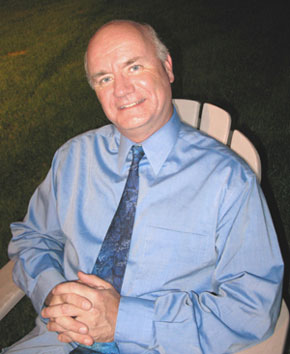New Year Will Bring
New Leadership to EOS
New Leadership to EOS
IN MID-SEPTEMBER, UNH Provost John Aber announced that astronomer Harlan Spence had been named the new director of EOS. Spence's appointment is effective January 1, 2010.
A professor of astronomy at Boston University, Spence studies theoretical and experimental space plasma physics and will bring six projects to UNH totaling more than $55 million in funding from the National Aeronautics and Space Administration and the National Science Foundation.
He will bring two large space exploration projects to campus to further strengthen the university's role in space physics. The Radiation Belt Storm Probes mission is intended to increase the safety of space exploration by increasing our understanding of energetic electrons and ions in Earth's space environment. (UNH, led by co-investigator Roy Torbert, already has a role in the RBSP mission.) The Cosmic Ray Telescope for the Effects of Radiation (CRaTER) project focuses on the radiation environment at the moon relative to future human or robotic exploration. Combined funding for these two long-term projects is nearly $47 million.
Says interim EOS director Janet Campbell, “I am very pleased that Harlan Spence will be joining us in January. As a member of the search committee I had the privilege of reading the strong recommendation letters from his colleagues, all of whom praised his leadership ability and congeniality. While his own research is focused on space physics, I’m confident that he will be an effective advocate for the Earth and oceans side of EOS.”
Associate director David Bartlett adds that Spence’s track record in successfully competing for research funding, together with his academic administrative experience, “make him a great fit for EOS. I'm greatly looking forward to working with him.”
And former interim director Roy Torbert, director of the Space Science Center, notes that Spence brings not only an exciting set of projects to EOS and the SSC but that his earlier interests in ocean and Earth science “will be important as he looks for ways to advance the scientific expertise of the institute in all areas.” -DS
A professor of astronomy at Boston University, Spence studies theoretical and experimental space plasma physics and will bring six projects to UNH totaling more than $55 million in funding from the National Aeronautics and Space Administration and the National Science Foundation.
 |
|
| Harlan Spence |
Says interim EOS director Janet Campbell, “I am very pleased that Harlan Spence will be joining us in January. As a member of the search committee I had the privilege of reading the strong recommendation letters from his colleagues, all of whom praised his leadership ability and congeniality. While his own research is focused on space physics, I’m confident that he will be an effective advocate for the Earth and oceans side of EOS.”
Associate director David Bartlett adds that Spence’s track record in successfully competing for research funding, together with his academic administrative experience, “make him a great fit for EOS. I'm greatly looking forward to working with him.”
And former interim director Roy Torbert, director of the Space Science Center, notes that Spence brings not only an exciting set of projects to EOS and the SSC but that his earlier interests in ocean and Earth science “will be important as he looks for ways to advance the scientific expertise of the institute in all areas.” -DS
by David Sims, Science Writer, Institute for the Study of Earth, Oceans, and Space. Published in Fall 2009 issue of EOS .
